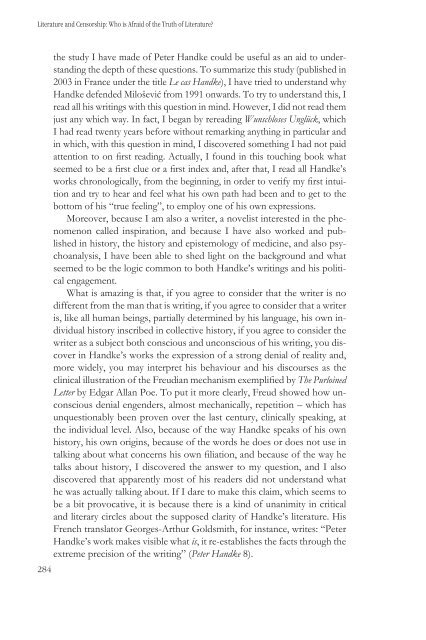Literatura in cenzura - Društvo za primerjalno književnost - ZRC SAZU
Literatura in cenzura - Društvo za primerjalno književnost - ZRC SAZU
Literatura in cenzura - Društvo za primerjalno književnost - ZRC SAZU
- No tags were found...
You also want an ePaper? Increase the reach of your titles
YUMPU automatically turns print PDFs into web optimized ePapers that Google loves.
Literature and Censorship: Who is Afraid of the Truth of Literature?284the study I have made of Peter Handke could be useful as an aid to understand<strong>in</strong>gthe depth of these questions. To summarize this study (published <strong>in</strong>2003 <strong>in</strong> France under the title Le cas Handke), I have tried to understand whyHandke defended Milošević from 1991 onwards. To try to understand this, Iread all his writ<strong>in</strong>gs with this question <strong>in</strong> m<strong>in</strong>d. However, I did not read themjust any which way. In fact, I began by reread<strong>in</strong>g Wunschloses Unglück, whichI had read twenty years before without remark<strong>in</strong>g anyth<strong>in</strong>g <strong>in</strong> particular and<strong>in</strong> which, with this question <strong>in</strong> m<strong>in</strong>d, I discovered someth<strong>in</strong>g I had not paidattention to on first read<strong>in</strong>g. Actually, I found <strong>in</strong> this touch<strong>in</strong>g book whatseemed to be a first clue or a first <strong>in</strong>dex and, after that, I read all Handke’sworks chronologically, from the beg<strong>in</strong>n<strong>in</strong>g, <strong>in</strong> order to verify my first <strong>in</strong>tuitionand try to hear and feel what his own path had been and to get to thebottom of his “true feel<strong>in</strong>g”, to employ one of his own expressions.Moreover, because I am also a writer, a novelist <strong>in</strong>terested <strong>in</strong> the phenomenoncalled <strong>in</strong>spiration, and because I have also worked and published<strong>in</strong> history, the history and epistemology of medic<strong>in</strong>e, and also psychoanalysis,I have been able to shed light on the background and whatseemed to be the logic common to both Handke’s writ<strong>in</strong>gs and his politicalengagement.What is amaz<strong>in</strong>g is that, if you agree to consider that the writer is nodifferent from the man that is writ<strong>in</strong>g, if you agree to consider that a writeris, like all human be<strong>in</strong>gs, partially determ<strong>in</strong>ed by his language, his own <strong>in</strong>dividualhistory <strong>in</strong>scribed <strong>in</strong> collective history, if you agree to consider thewriter as a subject both conscious and unconscious of his writ<strong>in</strong>g, you discover<strong>in</strong> Handke’s works the expression of a strong denial of reality and,more widely, you may <strong>in</strong>terpret his behaviour and his discourses as thecl<strong>in</strong>ical illustration of the Freudian mechanism exemplified by The Purlo<strong>in</strong>edLetter by Edgar Allan Poe. To put it more clearly, Freud showed how unconsciousdenial engenders, almost mechanically, repetition – which hasunquestionably been proven over the last century, cl<strong>in</strong>ically speak<strong>in</strong>g, atthe <strong>in</strong>dividual level. Also, because of the way Handke speaks of his ownhistory, his own orig<strong>in</strong>s, because of the words he does or does not use <strong>in</strong>talk<strong>in</strong>g about what concerns his own filiation, and because of the way hetalks about history, I discovered the answer to my question, and I alsodiscovered that apparently most of his readers did not understand whathe was actually talk<strong>in</strong>g about. If I dare to make this claim, which seems tobe a bit provocative, it is because there is a k<strong>in</strong>d of unanimity <strong>in</strong> criticaland literary circles about the supposed clarity of Handke’s literature. HisFrench translator Georges-Arthur Goldsmith, for <strong>in</strong>stance, writes: “PeterHandke’s work makes visible what is, it re-establishes the facts through theextreme precision of the writ<strong>in</strong>g” (Peter Handke 8).
















